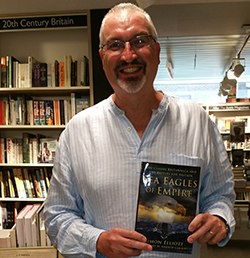The Department of Classical & Archaeological Studies is delighted to announce that Simon Elliott has completed his PhD, with a project entitled ‘Late Roman Kent’, under the supervision of Dr Steve Willis.
Kent was a key component of Roman Britain, featuring aspects it held in common with the rest of this north-western fringe of Empire, but also elements unique to the region. With economic activity for much of the occupation concentrated in three specific areas – the industrial zone of the Weald, a region ranging from Canterbury to Folkestone on the Channel coast, and the upper Medway Valley – the area covered by the modern county was particularly important for the exploitation of natural resources. These included ferrous-ores for iron production in the Weald, greensands for quern production around Folkestone and ragstone quarrying in the upper Medway Valley (the latter providing much of the building stone used in the occupation-period South East).
Simon’s PhD study brings together a wide range of research findings to present a picture of the economic use and associated organisation of this landscape. The study shows there to have been a hitherto unrecognised depth of economic exploitation, demonstrated by the variety of evidence types assembled in these pages. These activities had an important role within the Imperial, commercial and personal agendas of the time, with the thesis aiming to address the question of how and why these enterprises were brought into being in the area of Kent, and their links to wider spheres within the Empire.
Establishing the details of change and continuity regarding this exploitation provides a unique insight into the narrative of Roman Britain. It also allows some specific themes and theories to be explored, informing our wider knowledge of the occupation. These include the concept of the region as being more militarised than a ‘normal’ civitas, the links between elite settlement, individual agency and industry, the changing balance of importance between industry and agriculture, and what remained of Romanitas in Kent at the end of the occupation.
Our congratulations to Dr Elliott.
For more details of the PhD in Classical & Archaeological Studies, please see the page: www.kent.ac.uk/secl/classics/postgraduate/research-classical-archaeological-studies.html

